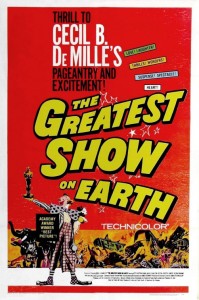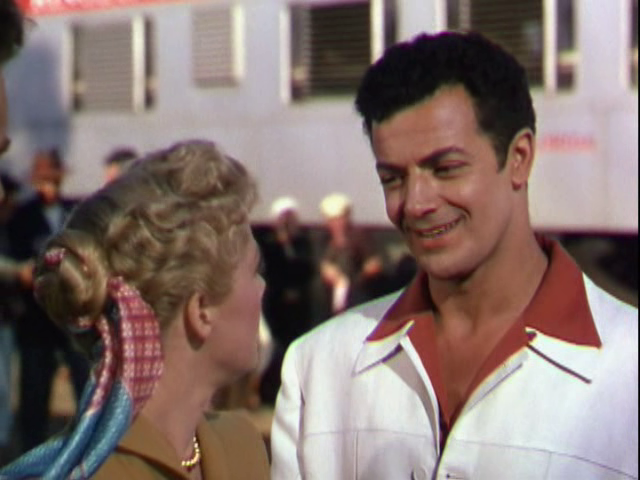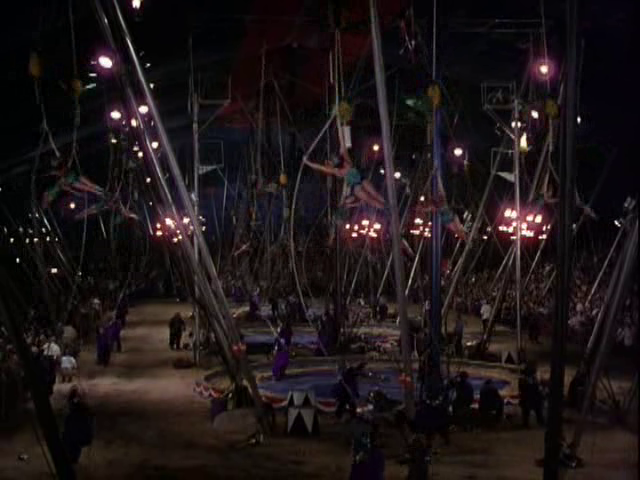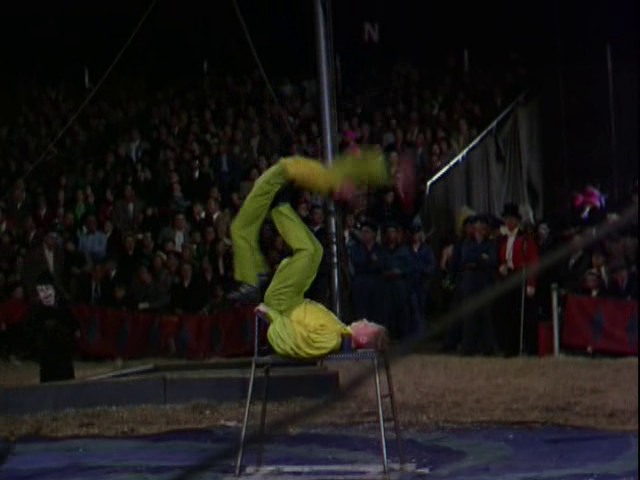|

Synopsis:
A circus manager (Charlton Heston) hires a famous aerialist (Cornel Wilde) as a new star act, provoking the jealousy of one of his current aerialists (Betty Hutton), who was hoping to take center stage herself. Meanwhile, a clown (Jimmy Stewart) with a deep secret hides his identity behind a permanent mask of make-up, and an elephant-rider (Gloria Grahame) dating an aggressive trainer (Lyle Bettger) secretly pines for Heston.
|
|
Genres, Themes, Actors, and Directors:
- Betty Hutton Films
- Carnivals and Circuses
- Cecil B. Demille Films
- Charlton Heston Films
- Cornel Wilde Films
- Dorothy Lamour Films
- Gloria Grahame Films
- Jimmy Stewart Films
- Lawrence Tierney Films
- Love Triangle
- Rivalry
Review:
Peary doesn’t review this notoriously “unworthy” Best Picture winner in his GFTFF (where he simply lists it in the back as a film with Historical Importance) — but in his Alternate Oscars, he summarily dismisses it as “entertaining junk”, noting that it likely won the award simply because “voters probably knew somebody in the all-star cast or huge production crew”. Peary’s certainly not alone in his cynical assessment; a quick glance at message boards on IMDb reveals the depth of many viewers’ frustration that such worthy Oscar contenders as Singin’ in the Rain and High Noon (for instance) were passed over in favor of TGSOE. (I’ve found that people tend to feel harshest about films they believe “undeservedly” stole critical kudos from acknowledged classics.)
At any rate, given its overall negative rap, I was surprised to find myself reasonably engaged as I revisited this over-the-top Technicolor spectacle (Cecil B. DeMille’s second-to-last directorial effort), which — as DVD Savant writes — “has too much color and too many varied circus acts to be boring.” I couldn’t seem to help getting caught up in the drama of it all — and darned if the central love quadrangle (between Heston, Hutton, Wilde, and Grahame) isn’t milked effectively until the very end, leaving you in “suspense” about who will end up with who. However, this faint praise is not meant to diminish the film’s more troublesome elements: it frequently (very frequently) devolves into campy melodrama; DeMille’s intrusive voice-over narration is often laughably grandiose; there’s some truly sloppy editing at times; the subplot involving Lawrence Tierney as a corrupt carny shyster is given too little screentime (we learn almost nothing about him — he simply appears, looking menacing); and there are far, far too many self-serving reaction shots of audience members gawking in wonder at the marvels of the circus (we get it already!).
At least the lead actors all seem game with the material. Hutton has been raked over the coals for her hyper-kinetic performance here, but what else would one expect from her? I actually think she’s wonderfully convincing as an acrobat (clearly she worked out quite a bit in preparation — before such things were so commonplace in Hollywood), and, as someone aggressively pursuing fame in her own life as well, she seems to suit her role to a tee. Heston is likewise perfectly cast as a man with so much “sawdust in his blood” that he literally breathes “circus” in and out. Wilde is the pleasant surprise of the bunch — he has rollicking fun with his role as a womanizing egomaniac with an alluring foreign accent (and what a body he crafted for the part!). Grahame’s role is frustratingly underwritten during the first half of the film, but she’s allowed more of a welcome presence during the second half. Stewart — notoriously remaining in make-up throughout the entire film — is appropriately subdued and mysterious in his critical role, which is based on a provocative premise. Meanwhile, the spectacle surrounding their various intertwining melodramas provides an interesting glimpse at what passed for entertainment in mid-century America — much of it (i.e., the acrobatic acts) remains just as thrilling today, while the remainder (i.e., the various “albums” paraded through the rings) is simply laughably quaint.
Note: Along with Tierney, poor Dorothy Lamour seems least-well-served here; her character is essentially a send-up of her previous glamour-girl roles (and watch for a silly cameo by her Road To… co-stars in the audience).
Redeeming Qualities and Moments:
- Cornel Wilde (having great fun) as the Great Sebastian

- An interesting time capsule glimpse of mid-century circus life and performances



- Plenty of unintentionally hilarious dialogue: “The only thing I like about you are your elephants.”
Must See?
Yes, simply for its historical notoriety.
Categories
- Historically Relevant
- Oscar Winner or Nominee
Links:
|
One thought on “Greatest Show on Earth, The (1952)”
A once-must, for its place in cinema history.
Til now, I probably haven’t seen this since I was a kid. (“Unworthy” Best Pic or not, it’s certainly nowhere near as embarrassing a Best Pic than ‘Around the World in 80 Days’!)
I agree that this is a reasonably compelling film and – the occasional clunky bit notwithstanding – it’s not difficult to get caught up in the spectacle and the storytelling. Of course, we’re not talking great acting here – DeMille wasn’t exactly a whiz with actors and he seemed to stress surface emotion. (The only one here who really ‘goes below’ effectively is Stewart.) But I suppose that’s because the director’s dual concern is the aforementioned spectacle/storytelling.
I don’t really agree with Peary re: why this film won the top Oscar award. Whatever is mainly thought of his films, DeMille toiled long and hard in cinema in a pioneering capacity – and I would think ‘Greatest Show’ had the edge as a means of ‘payback’ for his years of grand showmanship. (DeMille is kind of a William Castle in that sense – only with a larger vision and much more money at his disposal. Both men seemed to genuinely want to thrill audiences each time out.)
‘Greatest Show’ won its only other Oscar for its screenplay – that territory is a bit more dubious (especially when it comes to some of the actual dialogue, which can get ripe). However, the script does build progressively to a surprisingly satisfying level overall (especially when all hell breaks loose, as it certainly does near the end!).
DeMille worked in cooperation with circus groups of the period. So we do not get a ‘Water for Elephants’ view here. More than generally, the animals all appear to be well tended and treated. (One wonders.) The backstage drama is almost entirely human-based.
A circus show never meant much to me as a kid – something a little too raw about it, perhaps. But ‘TGSOE’ does cover just about every detail of the guts required to mount this kind of entertainment. Rather impressive in its own way.